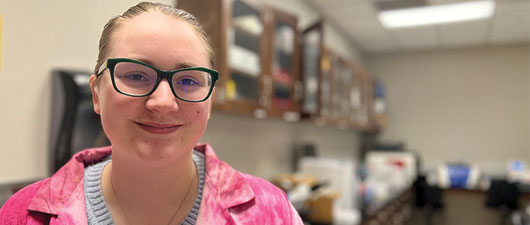Medical Laboratory Science
 Pictured | Ashley Schoen | Bachelor of Science in Clinical Laboratory Science | Elkhart, Indiana (hometown)
Pictured | Ashley Schoen | Bachelor of Science in Clinical Laboratory Science | Elkhart, Indiana (hometown)
Honors Program
Volunteer Activity | Here Kitty Kitty
Club Affiliations | Diversity in Disability (vice president); Titans on the Go
Bachelor of Science in Medical Laboratory Science
The Bachelor of Science in Medical Laboratory Science (MLS) provides students with the entry-level skills and knowledge needed to become success laboratory professionals and seek employment in a variety of sectors, including medical and diagnostic laboratories, research laboratories, government laboratories, higher education, regulatory agencies, and the manufacturing and sales industries.
Students enrolled in the Bachelor of Science in Medical Laboratory Science program complete courses in clinical chemistry, hematology, immunohematology (blood banking), immunology, management, microbiology, molecular diagnostics, and urinalysis and body fluids analysis. Lecture and corresponding laboratory courses take place in dedicated classroom and laboratory spaces in Vera Z. Dwyer Hall. Prior to graduation, students participate in clinical rotations to gain hands-on experience in clinical laboratories located in northern Indiana and southern Michigan.
The professional portion of the MLS program occurs during the final three semesters of a traditional bachelor's degree or as a stand alone sequence for individuals who hold a bachelor's degree. Admission to the professional portion of the MLS program is contingent upon completion of all required prerequisite courses. Students may seek admission to the MLS program as:
- a first-time, bachelor degree-seeking student
- a second degree student with a Bachelor of Science in biology, chemistry, or other related degree
- a certified Medical Laboratory Technician (MLT) wishing to advance to a bachelor degree.
Student who enter the MLS program as transfer or second degree students may be required to complete prerequisite courses prior to starting MLS courses.
Bachelor of Science in Medical Laboratory Science Vision Statement
The Bachelor of Science in Medical Laboratory Science program seeks to be recognized as the best source for well-educated Medical Laboratory Scientists in the region.
Bachelor of Science in Medical Laboratory Science Mission Statement
The Bachelor of Science in Medical Laboratory Science strives for educational excellence in the field of laboratory medicine through engaging students with active and authentic learning experiences while embracing diversity with a curriculum designed to promote intellectual growth, scholarship, and creative activities for faculty and students, innovation in laboratory techniques, and continuing education. Graduates with a Bachelor of Science in Medical Laboratory Science will increase the vitality of the economy as important members of the healthcare community.
Medical Laboratory Science Program Goals
The goals of the Bachelor of Science in Medical Laboratory Science are to:
- provide student with extensive preparation to work as a Medical Laboratory Scientist (MLS)
- address pre-analytical, analytical, and post-analytical components of laboratory services
- prepare students to perform diagnostic assays, use troubleshooting techniques, interpret results, and evaluate procedures
- address quality assurance, quality improvement, and continuous assessment of laboratory services
- address the importance of safety and application of government regulations and standards in the clinical laboratory
- foster growth through professional conduct and continuing professional development
NAACLS Accreditation
The Bachelor of Science in Medical Laboratory Science at IU South Bend is an accredited Medical Laboratory Science academic program by the National Accrediting Agency of Clinical Laboratory Science (NAACLS).
Academic Advising
Your academic advisor is a critical partner in fostering your success at IU South Bend and beyond. Your advisor will help you explore academic majors and careers, plan your degree, choose classes, learn about internships and study abroad, and much more. To see who is assigned as your advisor, visit your Student Online Advising Record in one.iu.edu. For more information about advising at IU South Bend, visit the website for the Undergraduate Advising Center.
Final responsibility for meeting degree requirements rests with the student.
Questions about advising? Email sbadvise@iu.edu or call (574) 520-4550.
Degree Requirements (120 cr.)
Degree Map >>
Students receiving the Bachelor of Science in Medical Laboratory Science must complete 120 credits including:
- IU South Bend Campuswide General Education Curriculum (33 cr.)
- Science Prerequisite Requirements (31 cr.)
- Major Requirements (46 cr.)
- Free Electives (balance of credits needed to equal 120 credit requirement)
- Students are required to apply officially to the program upon completion of their prerequisite courses and the majority of their co-requisite courses, typically during the summer between their sophomore and junior year.
- All courses are 3 credit hours, unless otherwise noted.
Major Requirements (46 cr.)
- CLS-B 399 Human Behavior and Social Institutions
VT: Clinical Laboratory Management - CLS-C 405 Clinical Chemistry
- CLS-C 406 Diagnostic Methods (2 cr.)
- CLS-C 407 Hematology
- CLS-C 408 Hematologic Methods (2 cr.)
- CLS-C 409 Hemostasis (2 cr.)
- CLS-C 415 Clinical Molecular Diagnostics and Special Chemistry
- CLS-E 401 General Externship I (2 cr.)
- CLS-E 402 General Externship II (2 cr.)
- CLS-E 403 General Externship III (2 cr.)
- CLS-E 404 General Externship IV (2 cr.)
- CLS-I 407 Immunohematology and Transfusion Medicine
- CLS-I 408 Blood Banking Methods (2 cr.)
- CLS-I 411 Clinical Immunodiagnostics
- CLS-L 420 Urinalysis (2 cr.)
- CLS-M 403 Clinical Microbiology
- CLS-M 404 Microbiological Methods (2 cr.)
- CLS-M 411 Mycology and Parasitology (2 cr.)
- CLS-M 413 Advanced Clinical Microbiology
Science Prerequisite Requirements (31 cr.)
- BIOL-L 101 Introduction to Biological Sciences I (5 cr.)
- BIOL-L 102 Introduction to Biological Sciences 2 (5 cr.)
- BIOL-L 211 Molecular Biology
- 300 or above biology course
- CHEM-C 105 Principles of Chemistry I
- CHEM-C 106 Principles of Chemistry II
- CHEM-C 125 Experimental Chemistry I (2 cr.)
- CHEM-C 126 Experimental Chemistry II (2 cr.)
- MICR-M 250 Microbial Cell Biology (or above)
- MICR-M 255 Microbiology Laboratory (2 cr.) (or above)